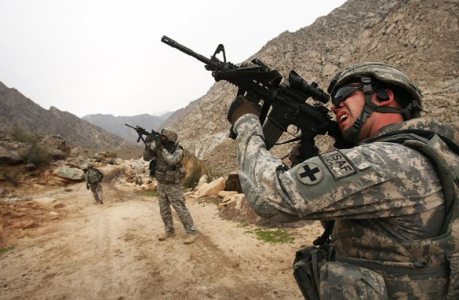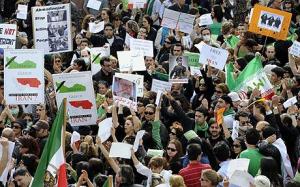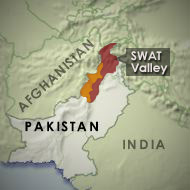Transformation of Iraq September 3, 2010
Posted by bdoza in International Affairs.Tags: Iraq
add a comment
 US is withdrawing its major forces from Iraq as declared by the Obama Government.
US is withdrawing its major forces from Iraq as declared by the Obama Government.
The question naturally comes up- could USA fulfill its mission in Iraq.
The US and its alliance invade the country on the presumptive presence of weapons of mass destruction even without the consent of UN in 2003. During its staying in Iraq for more than 7 years it didn’t find any weapons of mass destruction. USA, nevertheless, tried to justify the invasion by arguing that Iraq would have been a threat to safety of USA,though the Iraq missiles were proved to be ineffective to heat the targets that far,even to reach precisely to Israili destinations.
It was also presumed that Saddam had link with Al-Qaeda but no evidence was found in that respect also.
Before the invasion, Iraq was a country run by a dictator by the name Sadddam Hussain for long years. It was otherwise a prosperous nation without the practice of democracy.
Saddam Hussain and his forces could hardly stand bravely for a week and the country was conquered in less than a month. The citizens of the world could witness the magnitude of force and the precision of the modern weapons. Thousands were killed in the process, buildings and structures damaged. People started resistance. Resistance continued for days, months and years. Suicidal bombing was adopted as a technique in desperation. attacks and counter attacks continued. Baghdad in particular and Iraq in general transformed into a hell.
The US government tried to establish election and a democratic government in Iraq. I am not sure how far this system was accepted by the Iraqi people.
USA and allied forces also lost many of the soldiers leaving their families in distraught, many become disabled, many traumatized. US economy also affected by the burden of Iraqi war. The economic crisis might have been more deepen by the Iraq war.
Though Saddam has no link with Al-Qaeda, but many think that Iraq becomes the best breeding ground for Al-Qaeda once the war was started.
Once it was thought that Iraq might be divided into three regions. Though Iraq still is a single country, but sectarian fighting is taking away dozens of lives almost regularly.
Does Iraq transform into a better country than it was 7 years before?
An ordinary citizen
Link:
The true cost of the war
Shake Up Democracy: Give Your Vote April 10, 2010
Posted by bdoza in BANGLADESH, International Affairs.Tags: UK Vote
add a comment
 Give Your Vote is a campaign for democracy in a global world.
Give Your Vote is a campaign for democracy in a global world.
It’s simple: you give your vote to someone in Afghanistan, Bangladesh or Ghana. They use it to be part of the debate on decisions that affect them by casting a real vote in the 2010 UK election.
US dilemma on Afghan Strategy October 20, 2009
Posted by bdoza in International Affairs.Tags: Afganistan, Obama, USA, war against terrorism
1 comment so far
In the inau guaral speech President Obama outlined the strategy to combat terrorism. He promised to withdrew troops from Iraq and concentrate more on Afghanistan and if necessary to strike Pakistan. Troops withdrawal from Iraq has started as promised though a bit slowly, but US strikes the terror den along the Pak -Afghan border. But suicidal attacks now more spread up in larger areas of Pakistan.
guaral speech President Obama outlined the strategy to combat terrorism. He promised to withdrew troops from Iraq and concentrate more on Afghanistan and if necessary to strike Pakistan. Troops withdrawal from Iraq has started as promised though a bit slowly, but US strikes the terror den along the Pak -Afghan border. But suicidal attacks now more spread up in larger areas of Pakistan.
The war in Afghanistan is becoming increasingly difficult and US and other international allies are counting more casualties. When Obama was resetting his priorities and thinking not to increase forces in Afghanistan and concentrating more in Pakistan, his Chief Commander in Afghanistan declared publicly that 40000 more US troops are necessary to succeed there that made the Obama Administration embarrassed. The Secretary for Defence Gates had to tell the media that senior officials, civil or military. should convey their advice only privately to the administration in important state policies.
While Obama was pondering on the Afghan strategy the Nobel Committee in Oslo declared Nobel Peace Prize for 2009 to Obama which create more stress for Obamathat will linger rhe dilemma. Should he now stick not to send more troops to Afghanistan or prefer the notion of his Commander and send more troops to Afghanistan?
The people of the world hope that Obama will come out with clear decision which will create a more peaceful and terror free state in the world.The decision of Obama will dictate the peace in the region in future.
An ordinary citizen
Link:
USA is losing in two fronts in Afghan War
Some question the purpose of war in Afghanistan
Obama best person to handle the world’s mess-Sting
Post Script:
4 Dec 2009
President Obama declared much awaited Afghan strategy in a speech which highlighted addition of 30000 more US troops to the existing contingensy of 68000 in that country, training and transition to Afghan forces and gradual withdrawal of US forces from July 2011. He also announced more focus on Pakistan to haunt AL-Queda there.
Link: Full Text of Obama’s speech
Gates: Severe consequences on Afghan Failure
Obama own Nobel Peace Prize 2009 – Is it premature? October 9, 2009
Posted by bdoza in International Affairs.Tags: Nobel Peace Prize 2009, Obama, world peace
4 comments
 Barack Obama got the Nobel Peace Prize for 2009 that cought everybody surprized including Obama himself. When the prize was declared in Oslo,Norway, Obama was in sleep. After he heard the news, White House took time to express its first reaction to the announcement.
Barack Obama got the Nobel Peace Prize for 2009 that cought everybody surprized including Obama himself. When the prize was declared in Oslo,Norway, Obama was in sleep. After he heard the news, White House took time to express its first reaction to the announcement.
After becoming president, Obama started to spread hope of peace in the world even in his first inuguaral speech. He adopted a policy of reconciliation with the conflicting parties of the world. He visited the Muslim World and extended his hand for mutual respect, offers Iran direct talk, is trying to mediate peace-talk between Israel and Palestain, decided to close the American presence in Iraq, and is trying to fucus US war of terrorism on Al-Quaeda. He prefers multilateral approach for negotiating world conflicts and wants to make UN the main focus for decision making in international affairs. He offers Russia for reducing nuclear stocks and wants to prevent the neuclear proliferation in the world. He feels concern for the climate change and wants US to play its due role in this regard.
But all these are hopes. Most the aspirations are not materialised yet, some even not take any step. He is only 8 months in his office, his nomination was submitted only 2 weeks before the closing date. Under his command, US is at war with two countries and extending the war into another with many civilians dying every day because of the war.
We appreciate his effort for peace which he just initiates and we have to wait for the result.
Isn’t it a bit premature for him to get the prize? We are not sure how it will affect his mindset.
An ordinary citizen
Post-script:
Dr. Muhammad Yunus, the Nobel Laureate for peace in 2006 in an interview to BBC congratulated Obama on his getting Nobel Peace Prize for 2009.
UN summit: Changing the system of representation September 25, 2009
Posted by bdoza in International Affairs, UN.Tags: Gadhafi, Obama, Security Council, UN
2 comments
 Summit of 192 nations held in the General Assebly of the UN. Leaders of many countries projected their ideas in the summit from Barak Obama of USA to Nitalyaho of Israel. I could manage to listen to part of the session that telecasted live from the spot.
Summit of 192 nations held in the General Assebly of the UN. Leaders of many countries projected their ideas in the summit from Barak Obama of USA to Nitalyaho of Israel. I could manage to listen to part of the session that telecasted live from the spot.
Barak Obama deviating from his immediate predecessor expressed a reconciliatory tone in his speech which was well constructed and fluent as always with him. He stressed for a shared resporsibility of all the countries in the present world and emphasied for a greater role of UN in the future world.
After Obama left the hall, Gadhafi of Libya delivered his maiden speech in his 40 years in the throne. He was in an arrogant mood, giving reference to the preamble of the UN charter which was adoted at it’s birth, argued that the rules,regulations and procedure that drafted and followed later on virtually dictated by the big powers who ascertained veto power on themselves to dominate others. He argued for restructuring the Security Council on the basis of geopolitical representation of the member countries and designating the Security Council as the executive body of the General Assembly which will paly the decisive role in all UN matters.
The speech of Gadhafi was unnecessary lengthy and at times boring. Throughout the whole session, his speech was the most controversial and will be disliked by the superpowers. Though his speech may have not a changing impact on the structure of the UN, but it points to the previlegdes enjoyed by the superpowers over other countries for long years which he thinks shouldn’t be continued.
The ordinary citizen predicts that for good or bad there is little chance of changing the present structure of UN heirachy.
An ordinary citizen
World Economic Forum publishes World Competitive Report -2009-10 September 10, 2009
Posted by bdoza in BANGLADESH, ECONOMY, International Affairs.Tags: World Competitive Report 2009-2010, World Economic Forum
3 comments
World Economic Forum publishes world competitive report 2009-10
An ordinary citizen
The Face of Neo-Colonialism July 15, 2009
Posted by bdoza in BANGLADESH, International Affairs.Tags: colonialism, neo-colonialism
1 comment so far
For long, I had an innocent idea that the age of colonialism was over as we have become more civilised and modern with time.
But a recent discussion on a TV show by some academicians shattered my idea. According to them, the colonialism is not over, only the face has been changed.
In earlier days, physically conquering other territories was thought to be as an act of colonialism. If we consider the colonialism as keeping control over the other countries, then this control has changed from physical sense to economic and financial.
Now, no country in the world will go and try to keep another country by mere physical force or by the force of military. It is not that such attempts are not made in the recent past. But they failed and had to withdraw their forces and under the process of withdrawing their forces from those territories.
But I am more concern with the present economic colonialism. By economic colonialism we understand that making a targeted country depended on the economic support provided by the bigger countries and dictating the economic policies of that country and keeping the country ever so. By political colonialism, we mean dictating the state and political politcies of the targeted countries by the bigger countries.
To me, this tendency of economic and political colonialism is increasing with the emegence of new political mights in the world.
An ordinary citizen
Is it the end of Regime of Iran Islamic Revolution? June 21, 2009
Posted by bdoza in BANGLADESH, International Affairs.Tags: Ahmadinejad, Iran, Iran Guardian Council, Iran Islamic Revolution, Khameini, Mousavi, USA
6 comments

Iran turns into Regime of Islamic Revolution in 1979 ousting the then King Reza Shah Pahlavi by public upsurge led by Ayatullah Khomeini, the spiritual leader of the Islamic Revolution.
Since then Iran turns into a theocratic state, controlled by the clerics. The regime could sustained almost 30 years despite the conflict and opposition from outside and inside.
But turmoil that has erupted out of 12 June 2009 general election result where Ahmadinejad was declared winner and not accepted by Mousavi and other candidates and thier followers. The disgruntled supporters were staging relentless demostrations in the streets of Tehran and other cities in thousands denouncing the result of the election condemning it as massively rigged.
I made time to hear the sermon of Ayatullah Ali Khamenei, Supreme Leader and most powerful person of the statehood of Iran, presented in the last friday prayer. I was expecting that he would made a reconciliation between the potesters and declared winners. But his tone became gradually tougher after elaborating the background of the presidential candidates from Mushabi to Ahmadinijad. He tried to portray that the 4 presidential candidates are their men, they are part of Islamic revolution of Iran, at different times they serve the government and selected by the Guardian’s Counci to compete in the election.

He also appreaciated the protesters and their participation in shaping the democracy in Iran.He also argued that their protest is not against the regime.
But in conlusion, he expressed his strongest support for Ahmadinejad saying there was no rigging in the election but there may be some irregularities. He said if there is any dispute that will be solved within the set rules of the system.
He also threatened that from now on no protest will be tolerated and the protesters will have to bear the consequences.
During the sermon, Ahmedinejad and one more candidate were present. The other two were not seen
in the video-footage.
Khameini was highly critical of UK and other westrn power accusing them meddling the Iran’s internal affairs and trying to manipulate the election result in their own line of interest.
I thought that Khameini will declared a solution that will be acceptable to all parties,at least -recounting of all the votes, if fresh election is not acceptable. But he only agreed to partly count the votes- hardly 10% of the total.
It is now time to see how Mousavi and his supporters decide their own ways and react to the speech.
It is difficult to understand why the spiritual leaders like Khameini and members of the Guardian Council compromise with the minimum ethical standard where ‘all the candidates are my men’.
Is the Guardian Council at conflict with the Supreme Leader Ayatullah Khameini? If there is gross irregularities , it is certain to happen.
Is the Regime of Islamic Revolution at the end of its tenure?
The best period of Islamic statehood -the Khilafat e Rasul was also sustained for nearly 30 years only and then assination of Hazrat Ali led to the end of the period.
Will Iran embrace the same fate?
An ordinary citizen
Post link:
Reuter: Iran system seen resilient despite election rift
Pakistan: What is after Swat? June 5, 2009
Posted by bdoza in BANGLADESH, International Affairs.Tags: militancy, Pakistan, Taliban, Talibanism, terrorism, USA
2 comments
 Pakistan Army is fighting the Talibans in the Swar Valley . Earlier, to confine the Talibans and then to destroy their bases the civil population of the Swat Valley was shifted out of the area. It is estimated that about 2 million people had to displaced from Swat Valley.
Pakistan Army is fighting the Talibans in the Swar Valley . Earlier, to confine the Talibans and then to destroy their bases the civil population of the Swat Valley was shifted out of the area. It is estimated that about 2 million people had to displaced from Swat Valley.
After days of fighting Pakistan Army could hold some control over the valley which was earlier under the control of Talibans.
But could Pakistan Government keep its control over the valley for long? It is dificult to predict this for an ordinary citizen from distant.
At the start of the Afgan War, Talibans were confined in Afganistan. When the International Alliance led by USA swept over the country, many Talibans fled to and took shelter at Pak -Afgan Border. USA repeatedly urged Pakistan to take actions against the build up of militants at the border. Later on they even used ‘Drone’ piliot warplane to fight the talibans.
The ordinary citizen is not aware why the Talibanism is sreading into Pakistan? Is it strategic failure of USA and it’s Alliances or is it a failure of the Afgan Government to negitiate the Talibans or is it a policy failure on the part of Pakistan?
The ordinary citizen predicts that the stretagy taken by Pakistan will dessiminate the terrorist activites to other cities of Pakistan and will make the life of the citizens and the state of the governance more miserable.
Is their any other way to contain the violence? Is it possible to bring the Taliban in the political process of the countries like Afganistan and Pakistan? In the course of time common people are supposed to reject the extreme fanaticism that these forces are advocating.
I am doubtful about wiping out the Talibansm by absolute military means, we should also think some sort of political means to combat it.
The rise of militancy in Pakistan will not be a good sign for its neighbours.
An ordinary citizen











